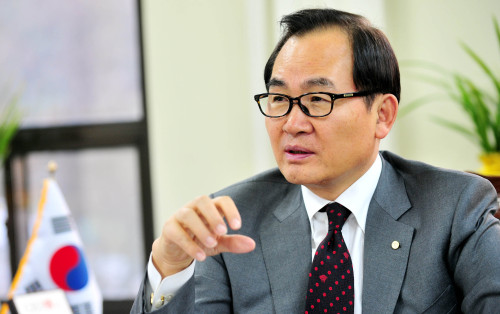Being the first in something always draws attention.
Such was the case for Yoon Eun-key, who became the first non-bureaucrat to take the helm of the Central Officials Training Institute eight months ago.
The former corporate consultant, lecturer, radio host and university president has held a dozen job titles, but had never served in the public sector before.
“With my experience in corporate education and school education, I believe I was appointed to this position to innovate education for civil servants,” Yoon told The Korea Herald.
“I’ve been in broadcasting, writing and consulting, but I feel education is my calling. I can blend the characteristics of education for businessmen, university students and public officials.”
One of the first things Yoon ordered as soon as he took office was to get rid of some of the old curricula and replace them with new ones.
“Because civil servants at certain stages are legally bound to come to COTI for training, the institute had a tendency to repeat the same curricula over and over,” he said.
“The amount of knowledge we provide is not important. What matters is learning something new.”
The new courses include those on policymaking for a fair society; the impacts of free trade agreements on businesses and the agricultural sector; and national security issues after North Korea’s attacks on the Cheonan naval ship and Yeonpyeong Island.
Among the most popular lecturers were female boxer Kim Joo-hee, who spoke about how she overcame poverty and injuries to win four world titles, and legendary Korean War commander Gen. Paik Sun-yup.
 |
COTI president Yoon Eun-key speaks during the interview at his office in Gwacheon, just south of Seoul. (Kim Myung-sub/The Korea Herald) |
Yoon aims to make COTI spearhead reforms in the officialdom instead of simply supporting other government agencies from the rear.
He seeks to benchmark the Motorola University and General Electronics’ Crotonville Training Center, which are known for leading change and innovation across entire corporations.
Yoon wants public officials to think faster, and act more fairly.
“Korea’s public officials, who are selected through highly competitive civil service exams, are excellent human resources, but because of their guaranteed status and their rigid organizational culture, they think slowly and choose not to make full use of their capabilities,” Yoon said.
“Civil servants should be fast learners to keep up with new trends and changes in the private sector. National competitiveness and productivity come from speed. If we speed up, we can make more progress with the same input of budget and manpower.”
He attributed Korea’s relatively quick recovery from the global economic crisis to the Lee Myung-bak administration’s prompt policy judgments and the successes of Korean companies like Samsung, LG and POSCO to their “speed management.”
To compete with China, Korea has to rely on “economy of speed,” he said.
Yoon also emphasized that public officials should refrain from pursuing only the interests of the ministry they belong to.
“As they move up the bureaucratic ladder, government officials tend to become more narrow-minded and confined to the ministry they work in. Top officials often put their ministry’s interests before national interests,” he said.
“Officials must overcome their ministry-centered way of thinking and broaden their perspectives.”
For this, the 59-year-old chief introduced a weekly seminar on national strategies for senior officials of first and second grades.
About 1,000 officials from different ministries are required to attend the Saturday seminars four times each to discuss major national agenda such as the Seoul G20 summit, social integration and the aging society.
“At first, not many people liked the idea of attending a seminar on Saturday,” Yoon said.
“But thanks to our efforts to invite cream of the crop lecturers and various prizes, most of the participants are now highly satisfied with the seminars.”
The former star lecturer said he applied private sector techniques for customer satisfaction to raise the self esteem and honor of the officials.
“We start the sessions by showing a very moving video on public officials’ contributions toward Korea’s national development to make them feel good about their jobs,” said Yoon, who majored in psychology as an undergraduate.
“We also give out prizes for those who arrive first or pay the most attention during the lectures, and this has really encouraged them.”
After the classes, the trainees and the lecturers ― who include ministers, vice ministers, chief executives of private companies and senior staff of the presidential office ― go out to mingle and debate over lunch and drinks.
This year, Yoon plans to expand tailored training programs for foreign government officials.
Since 1984, more than 3,500 foreign government officials have completed training programs at COTI. They learned about Korea’s economic development and successful policies, such as the establishment of e-government and the drive for low-carbon, green growth.
Russian officials, for example, studied Korea’s trade system in 2008, government procurement policy in 2009 and advancement of public companies last year.
This year, COTI is scheduled to run courses for 205 public officials from Myanmar, Brunei, Malaysia, Paraguay, Bolivia, Japan, Azerbaijan, Russia, Kazakhstan as well as African countries including Nigeria and Kenya.
By Kim So-hyun (
sophie@heraldcorp.com)







![[Today’s K-pop] Blackpink’s Jennie, Lisa invited to Coachella as solo acts](http://res.heraldm.com/phpwas/restmb_idxmake.php?idx=644&simg=/content/image/2024/11/21/20241121050099_0.jpg)
